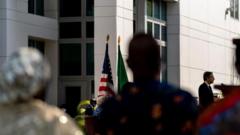The US Department of State's recent decision to shorten visa validity for most Nigerian applicants has sparked discussions on diplomatic relations.
US Implements Visa Restrictions for Nigerian Travelers

US Implements Visa Restrictions for Nigerian Travelers
New policy mandates single-entry visas, valid for only three months.
The United States has unveiled significant changes to its non-immigrant visa policies affecting Nigerian citizens, introducing a new structure that limits the duration and terms of entry into the country. Effective July 8, nearly all non-immigrant and non-diplomatic visas granted to Nigerian applicants will now be classified as single-entry and will be valid for a mere three months. This development marks a major departure from prior agreements, which often permitted multiple entries spanning two years or longer.
In a reciprocal move, Nigeria has implemented similar measures, offering single-entry visas that are also valid for three months to US visitors. The Nigerian government has yet to provide an official response to this decision.
The US State Department emphasized that visa regulations are "subject to ongoing review," indicating potential future adjustments linked to evolving diplomatic dynamics, security concerns, and immigration criteria. The US administration has stated its commitment to collaborating with Nigerian authorities to meet essential international standards. Key benchmarks include issuing secure travel documents, managing overstay issues, and sharing essential security or criminal information for public safety.
Additionally, all visa applicants from Nigeria, as well as other foreign applicants, will undergo social media scrutiny to check for any signs of hostility towards American citizens, culture, or governance.
Nigeria is a notable contributor to the US educational system, ranking as the seventh largest source of international students globally, according to the 2024 Open Doors report. With a total of 20,029 Nigerian students enrolled in American institutions, figures reflect a 13.5% increase from the previous year.
In light of these visa changes, local political figures have expressed skepticism about the rationale behind the US's decision. Bashir Ahmad, a former aide to ex-president Muhammadu Buhari, took to social media, suggesting that the new restrictions stem from a growing US unease with Nigeria's evolving geopolitical alliances, particularly following President Bola Tinubu's recent engagement with the BRICS forum. He remarked that the move appears less about reciprocity and more indicative of the US's discomfort with Nigeria's global realignments.






















